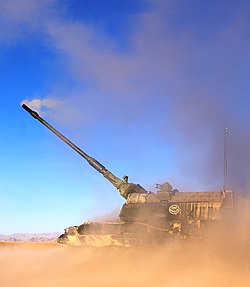Battle of Chora
| Battle of Chora | |||||||
|---|---|---|---|---|---|---|---|
| Part of the War in Afghanistan (2001–2014) | |||||||
 Dutch army PzH 2000 firing on Taliban in Chora. June 16, 2007. Photo by David Axe. |
|||||||
|
|||||||
| Belligerents | |||||||
|
Coalition: |
|
||||||
| Commanders and leaders | |||||||
|
|
|
||||||
| Strength | |||||||
|
150–200 militia |
Unknown, possibly several hundred | ||||||
| Casualties and losses | |||||||
| 2 killed (Dutch), 1 killed (United States), 16 killed (Afghan police) |
71 killed | ||||||
| 65 civilians killed | |||||||
The Battle of Chora took place in and around the town of Chora (3,000 inhabitants), in Afghanistan's Orūzgān Province, during June 15–19, 2007. The fighting was between ISAF and Afghan forces on one side and Taliban forces on the other, for the control of the Chora District centre, regarded by the Taliban as a tactical target because it provides ground access from unsecured Gizab district in the north to the provincial capital of Tarin Kowt. According to some press reports, the fighting was the largest Taliban offensive of 2007 in Afghanistan, and resulted in the death of one American, two Dutch and 16 Afghan soldiers, as well as approximately 58 civilians and 71 Taliban fighters.
Oruzgan province, along with neighboring Kandahar and Helmand provinces in southern Afghanistan, is part of the Taliban's traditional Pashtun tribal stronghold. In Oruzgan, NATO's ISAF mission took over authority for Afghanistan from the US-led coalition in August 2006, resulting in 1,400 Dutch soldiers replacing some 150 US troops at the Provincial Reconstruction Team (PRT) in Oruzgan's provincial capital, Tarin Kowt, and other bases. In addition to co-located Afghan battalions, there was an Australian element under Dutch command and contributions from other NATO allies. Oruzgan is 2/3 the size of the Netherlands, but the Dutch presence has been challenged with providing security to areas it patrols regularly. When faced with the security challenge, the Dutch reverted to an "inkspot policy" whereby they focused their attention only on Oruzgan's three population centres, leaving other areas to Taliban control.
Dutch activities included setting up checkpoints, some of which were near the town of Chora. At the time, there were 100 Afghan police in Chora.
Dutch troops were working in Chora on projects such as a school, a mosque and a bridge, following up on civilian construction projects initiated by the US. 60 Dutch troops were deployed in Chora.
On Friday evening June 15 there was some shooting near Chora. In the morning of that day, a Dutch convoy in Tarin Kowt was attacked by a suicide bomber, killing a Dutch soldier, Timo Smeehuijzen and several Afghan civilians.
A U.S. A-10 Thunderbolt II spotted a group of 60 persons moving toward Chora. Dutch troops at Chora were informed, but the A-10 did not engage the group, due to uncertainty over their identity and intentions.
...
Wikipedia
